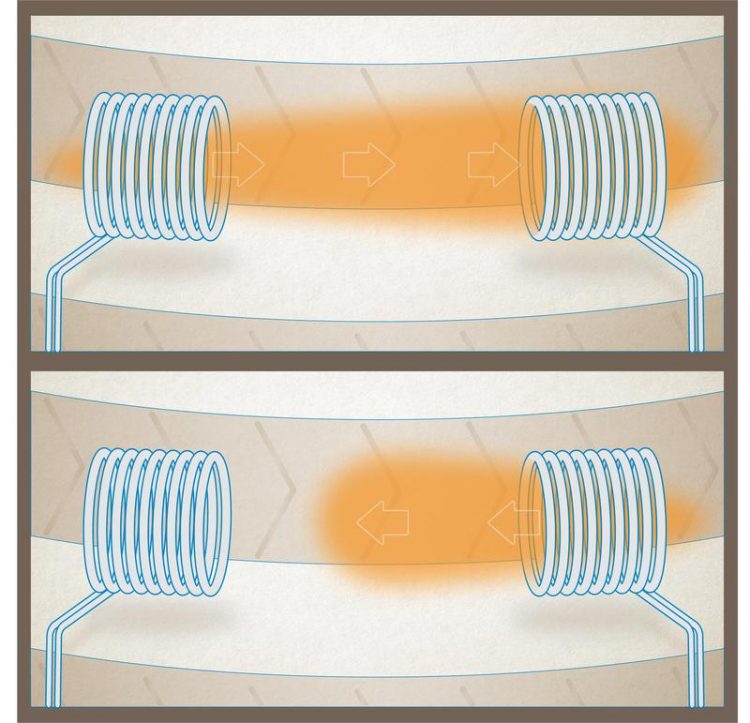First diode for magnetic fields

When the left coil is energized, the magnetic field reaches the right coil (top). When the right coil is energized, the magnetic field does not reach the left one (bottom). Luis Veloso
Electric diodes are essential electronic components that conduct electricity in one direction but prevent conduction in the opposite one. They are found at the core of any electronic component, being one of the most essential building blocks.
Until now there were no such components for magnetic fields. Physicists at the University of Innsbruck and the ÖAW Institute of Quantum Optics and Quantum Information (IQOQI) are now changing that. They designed the first diode for magnetic fields and demonstrated its functionality in the laboratory.
“Our device makes possible to transfer the magnetic field from a first magnetic element – for example a magnet or a coil – to a second one. When roles are inverted and one tries to send magnetic field from the second to the first, no magnetic field is transferred,” explains first author Jordi Prat Camps, who is now a researcher at the University of Sussex in England.
Technically speaking, this means that the mutual inductances between the two sources, which are routinely assumed to be symmetric, can be made extremely asymmetric. The key element to obtain this result is the use of an electrical conductor that moves with constant velocity.
“When the conductor is properly placed near to the magnetic elements and is moved at the right speed, the coupling between them becomes unidirectional, and a diode for magnetic fields is realized”, says Jordi Prat Camps.
Coupled magnetic elements are found in many key technologies like electric motors, transformers, magnetic memories or MRI machines. In all of them, magnetic elements are symmetrically coupled.
“The availability of a new magnetic tool like a diode might thus open a bunch of new possibilities”, Gerhard Kirchmair points to the future. For example, the efficiency of wireless charging devices could be improved, since the energy can only flow from the charging station to the device and not in the other direction.
The work was financially supported by the Austrian Ministry of Education, Science and Research and the European Union and published in the journal Physical Review Letters.
Jordi Prat-Camps
Interact Lab
University of Sussex
phone: +44 01273872642
email: J.Prat-Camps@sussex.ac.uk
web: http://pratcamps.weebly.com
Circumventing Magnetostatic Reciprocity: A Diode for Magnetic Fields. J. Prat-Camps, P. Maurer, G. Kirchmair, and O. Romero-Isart. Phys. Rev. Lett. 121, 213903 DOI: https://doi.org/10.1103/PhysRevLett.121.213903
https://physics.aps.org/synopsis-for/10.1103/PhysRevLett.121.213903 – Physics Synopsis: One-Way Transfer of Magnetic Fields
https://iqoqi.at/en/group-page-romero-isart – Quantum Nanophysics, Optics and Information (Oriol Romero-Isart)
https://iqoqi.at/en/group-page-kirchmair – Superconducting Quantum Circuits (Gerhard Kirchmair)
Media Contact
More Information:
http://www.uibk.ac.atAll latest news from the category: Physics and Astronomy
This area deals with the fundamental laws and building blocks of nature and how they interact, the properties and the behavior of matter, and research into space and time and their structures.
innovations-report provides in-depth reports and articles on subjects such as astrophysics, laser technologies, nuclear, quantum, particle and solid-state physics, nanotechnologies, planetary research and findings (Mars, Venus) and developments related to the Hubble Telescope.
Newest articles

Facing the Storm: A Prepped Up Future Against Extreme Climatic and Weather Changes
From the persistent droughts of southern Africa and Central America in the early part of the year to the more recent devastating extreme rainfall in Spain and the deadly Hurricane…

Magnetic Effect: Groundbreaking Discovery for Low-Temperature Thermoelectric Cooling
Researchers at the Max Planck Institute for Chemical Physics of Solids, in collaboration with Chongqing University and the Max Planck Institute of Microstructure Physics, have achieved a breakthrough in topological…

Parallel Paths: Understanding Malaria Resistance in Chimpanzees and Humans
The closest relatives of humans adapt genetically to habitats and infections Survival of the Fittest: Genetic Adaptations Uncovered in Chimpanzees Görlitz, 10.01.2025. Chimpanzees have genetic adaptations that help them survive…



